- Home
- Astrid Lindgren
The Brothers Lionheart Page 2
The Brothers Lionheart Read online
Page 2
Rusky Lionheart—it sounded crazy, so we giggled. And then we laughed more and more, just as if it were the funniest thing we’d heard for ages, though it was probably because we wanted something to laugh at. We were so happy that everything was whirling inside us. And when we’d laughed for ages, we wrestled together, but that didn’t stop our laughing. No, indeed not; we went on until we fell over in the grass and we lay there and rolled around laughing more and more, finally laughing so much that we fell into the stream, and then we laughed so much that I thought we’d drown.
But instead we started to swim. I’ve never been able to swim, although I’ve always wanted to learn. Now I could, just like that. I was swimming away like anything.
“Jonathan, I can swim!” I shouted.
“Yes, of course you can swim,” said Jonathan.
And then I suddenly though of something.
“Jonathan, have you noticed something?” I said. “I’ve stopped coughing.”
“Yes, of course you’ve stopped coughing,” said Jonathan. “You’re in Nangiyala now.”
I swam around for quite a while and then I scrambled up on to the bridge and stood there, wet through, the water running out of my clothes. My trousers were clinging to my legs, which was why I could see so clearly what had happened. Believe it or not, my legs were quite straight, just like Jonathan’s.
Then I thought, suppose I’ve become beautiful too? I asked Jonathan if he thought so, whether he could see if I had grown beautiful.
“Look in the mirror,” he said, and he meant the stream, for the water was shiny and still, so that you could your reflection in it. I lay down on my stomach on the bridge and peered over the edge and I saw myself in the water, but I didn’t see anything particularly beautiful about me. Jonathan came and lay down beside me, and we lay there for a long time, peering at the Lionheart Brothers down there in the water, Jonathan so beautiful with his golden hair and his eyes that fine face he has, and then me with my knobby snout and straggly hair and all that.
“No, I don’t think I’ve grown any more beautiful,” I said.
But Jonathan thought there was a great difference now.
“And you look so healthy, too,” he said.
Then I felt myself all over. I felt, as I lay there on the bridge, that I was healthy and well in every bit of me, so why did I need to be beautiful? My whole body was so happy that it seemed to laughing all over.
We lay there for a while and let the sunlight warm us, and we watched the fish swimming in and out under the bridge. But then Jonathan wanted us to go home and so did I, because I was curious to see Knights Farm, where I was going to live.
Jonathan walked ahead of me up the path to the farm, and I trotted after him with my fine straight legs. I just walked along staring at my legs and feeling how good it was to walk with them. But when we’d got a little way up the slope, I suddenly turned my head. And then—then I saw Cherry Valley at last! Oh, that valley was white with cherry blossoms everywhere. White and green, it was, with cherry blossoms and green, green grass. And through all that green and white, the river flowed like a silver ribbon. Why hadn’t I even noticed it before? Had I seen nothing but Jonathan? But now I stood quite still on the path and saw how beautiful it was, and I said to Jonathan:
“This must be the most beautiful valley on earth.”
“Yes, but not on earth,” said Jonathan, and then I remembered that I was in Nangiyala.
All around Cherry Valley were high mountains, and that was beautiful too. And down the mountain slopes, streams and waterfalls ran into the valley so that it sang of it, for it was spring.
There was something special about the air, too. It felt as if you could drink it, it was so pure and clean.
“They could do with a few kilos of this air back home,” I said, as I remembered how I used to long for air as I lay on my kitchen sofa-bed, feeling as if there were no air at all.
But here there was, and I breathed in as much of it as I could. It was as if I couldn’t have enough of it. Jonathan laughed at me and said:
“You might leave a little for me, you know.”
The path we were on was white with fallen cherry blossoms, and fine white petals came whirling down on us, so that we got them in our hair and everywhere, but I like small green paths with cherry blossom petals on them, I really do.
And at the end of the path lay Knights Farm with the green notice on the gate.
“The Lionheart Brothers,” I read aloud to Jonathan. “Just think this is where we’re going to live.”
“Yes, think of that, Rusky,” said Jonathan. “Isn’t it fine?”
And it was fine. I understood why Jonathan thought so. For my part, I couldn’t even imagine anywhere better to live.
An old white house, not at all big, with green timbers and a green door and a bit of green ground all around, where cowslips and saxifrage and daisies grew in the grass. Lilacs and cherry trees too, in full bloom, and around it all was a stone wall, a little gray wall with pink flowers on it. You could have jumped over it easily, but nevertheless, once inside the gate, that wall felt as if it protected you from everything outside; it felt as if then you were home and on your own.
Actually there were two houses there, not just one, though the other one was more like a stable or something like that. They lay at an angle to each other, and just where they met was an old bench that looked as if it had come from Stone Age, almost. It was a nice bench and a nice corner, anyhow. You almost felt like sitting there and thinking a little, or talking and looking at the birds and perhaps drinking fruit juice or something.
“I like it here,” I said to Jonathan. “Is it just as nice indoors?”
“Come and look,” he said. He was already standing by the door and just about to go in, but at that moment there was a whinny—yes, it really was a horse whinnying—and Jonathan said:
“I think we’ll take the stable first.”
He went into that other house and I ran after him; just you guess whether I ran after him!
It was indeed a stable, just as I’d thought, and there were two horses there, two beautiful brown horses, which turned their heads and whinnied at us as we came in through the door.
“This is Grim and Fyalar,” said Jonathan. “Guess which is yours.”
“Oh, go on,” I said. “Don’t you try telling me there’s a horse for me, because I just don’t believe it.”
But Jonathan said that in Nangiyala no one could manage without a horse.
“You can’t get anywhere without a horse,” he said. “And you see, Rusky, you have to go a long way here sometimes.”
It was the best thing I’d for ages—that you had to have a horse in Nangiyala—because I like horses so much. Think how soft their noses are. I don’t think there’s anything in the world so soft.
A pair of unusually beautiful horses they were, those two in the stable. Fyalar had a white blaze on his forehead, but otherwise they were just like each other.
“Then perhaps Grim is mine,” I said. Jonathan wanted me to guess.
“Well, you’re wrong there,” said Jonathan. “Fyalar’s yours.”
I let Fyalar nuzzle me, and I patted him without being a bit scared, although I’d hardly ever touched a horse before. I liked him from the start, and he seemed to like me too, at least so I thought.
“We’ve got rabbits, too,” said Jonathan. “In a hutch behind the stable. But you can look at them later.”
I might have guessed it!
“I must see them now, at once,” I said, for I’ve always wanted to keep rabbits and at home in town you just couldn’t have them.
I made a quick little tour around behind the stable, and there in a hutch were indeed three lovely little rabbits, chewing on some dandelion leaves.
“It’s funny,” I said to Jonathan afterward. “Here in Nangiyala there’s everything I ever wished for.”
“Yes, but that’s what I told you,” said Jonathan. And it was exactly as he’d told me,
while he’d sat there with me in the kitchen at home. Though now I was able to see that it was true, too, and I was pleased about that.
There are something things you never forget. Never, ever, shall I forget that first evening in the kitchen at Knights Farm, how wonderful it was and what it felt like to lie talking to Jonathan just as before. Now we were living in a kitchen again as we had always done, although it didn’t look like our kitchen at home town, that’s for sure. The kitchen at Knights Farm must be ancient, I thought, with its thick beams in the ceiling and its large open fireplace. What a fireplace; it took up half the wall and if you wanted to cook some food, you had to do it directly over the fire, just as they used to in the old days. In the middle of the floor was the sturdiest table I’ve ever seen in my life, with long, wooden benches down each side, and I reckon at least a score of people could sit there and eat at the same time without being too crowded.
“We might as well live in the kitchen as we used to,” said Jonathan. “Then Mother can have the other room when she comes.”
One room and a kitchen, that was what Knights Farm was, but we weren’t used to and didn’t need any more. All the same, it was at least twice as big as at home.
At home! I told Jonathan about the note I had left on the kitchen table for Mother.
“I wrote to her that we’d meet her in Nangiyala. Though who knows when she’ll come.”
“It may be some time,” said Jonathan. “But she’ll have a good room with space for ten sewing machines, if she wants them.”
Guess what I like! I like lying in an ancient old cupboard-bed in an ancient old kitchen, talking to Jonathan while the light from the fire flickers around the walls, and when I look out of the window, I see a branch of a cherry tree swaying in the evening breeze. And then the fire gets smaller and smaller, until only the embers are left, and the shadows thicken in the corners, and I get sleepier and sleepier, and I lie there and don’t cough and Jonathan tells me things. Tells me and tells me and tells me, and in the end I heard his voice just like those whisperings again, and then I fall asleep. That’s exactly what I like, and that’s what it was like that first evening at Knights Farm, and that’s why I’ll never forget it.
chapter 4
And the next morning we went riding. Oh, yes, I could ride, and yet it was the first time I’d ever been on horseback—I can’t understand how things are like that in Nangiyala, that you can do just anything, I mean. I galloped on as if I’d never done anything else.
But Jonathan when he was riding! The woman who had thought that my brother liked a prince in a saga, she should have been there as he came swooping along on his horse through the meadows in Cherry Valle, then she would have seen a saga prince that she never would have forgotten! Oh, as he came at a gallops and then leapt over the stream, as if flying, so that his hair was flowing around him, yes, you really could believe that he was a prince in a saga. He was nearly always dressed like that, or perhaps more like a knight. There were lots of clothes in a cupboard at Knights Farm, wherever they had come from, and they weren’t anything like the clothes we have nowadays, but just like a knight’s clothes. We had taken some out for me, too, having thrown away my ugly old rags, which I never wanted to see again. For Jonathan said we must be dressed so that it suited the times we were living in now; otherwise the people in Cherry Valley would think we were peculiar. The days of campfires and sagas; wasn’t that what Jonathan had said? As we were riding around in that beautiful valley of ours, I asked him:
“They must be dreadfully olden days that we’re living here in Nangiyala, mustn’t they?
“You could say that, in some ways,” said Jonathan. “They’re olden days for us. But you could also say that they were young days.”
He thought for a while.
“Yes, that’s it,” he said. “Young, healthy, and good days, which are easy and simple to live in.”
But then his eyes darkened.
“At least here in Cherry Valley,” he said.
“Is it different in other places?” I asked, and Jonathan said that it could indeed be different in other places.
What luck that we landed up here! Here in Cherry Valley, where life was as easy and simple as Jonathan had said. It couldn’t be easier or simpler than on a morning like this. First you’re awakened in your kitchen by the sun shining in through the window and the birds twittering and happy in the tree outside, and you see Jonathan quietly setting out bread and milk on the table for you, and when you’ve finished, you go out and feed your rabbits and groom your horse. And then you ride off, oh, you ride off, and there’d dew on the grass, glittering and shining everywhere, and bumblebees and ordinary bees humming in the cherry blossoms, and your horse gallops away and you’re not even afraid that it’ll all suddenly come to an end, like everything that’s fun usually does. Not in Nangiyala! At least not here in Cherry Valley!
We rode through the meadows, hither and thither as things came, then we followed the path along the stream, twisting and turning and suddenly we saw the morning smoke from the village down in the valley, at first just the smoke and then the whole village itself with its old houses and farm. We heard cocks crowing and dogs barking and sheep and goats bleating; it all sounded like morning, all of it. The village must have just awakened.
A woman with a basket on her arm came toward us on the path, a peasant woman, I think, neither young nor old, but a bit in between, brown skinned as you get when you’re out in all weathers. She was dressed in an old-fashioned way, rather like in the sagas.
“Oh, Jonathan, your brother’s come at last, has he?” she said, smiling in a friendly way.
“Yes, he’s come now,” said Jonathan, and you could hear that he thought that was good. “Rusky, this is Sofia,” he said then, and Sofia nodded.
“Yes, this is Sofia,” she said. “I’m glad I met you. Now you can take the basket yourselves.”
Jonathan took the basket as if he were used to doing that and didn’t have to ask what was in it.
“You’ll bring your brother down to the Golden Cockerel this evening, won’t you, so that everyone can meet him?” said Sofia.
Jonathan said that he would, and then we said good-bye to her and rode homeward. I asked Jonathan who the Golden Cockerel was.
“The Golden Cockerel Inn,” said Jonathan. “It’s the inn down in the village. We meet there and talk about what we have to talk about.”
I thought it would be fun to go with him to the Golden Cockerel in the evening and see what kind of people lived in Cherry Valley. I wanted to know everything about Cherry Valley and Nangiyala. I wanted to see if it was exactly like what Jonathan had told me. Then I happened to think of something, and I reminded him about it as we rode along.
“Jonathan, you said that in Nangiyala you could have adventures from morning till evening, and at night too, do you remember? But here it’s so quiet and there are no adventures at all.
Jonathan laughed.
“You only came yesterday, don’t forget. Silly, you’ve hardly had time to poke your nose in yet. There’ll be time enough for adventures I think.”
When I’d got my thoughts straight on the matter, I said that it was adventurous and marvelous enough as it was with Knights Farm and our horses and rabbits and everything. I didn’t need any more adventures than that.
Then Jonathan looked strangely at me, almost as if he were feeling sorry for me, and he said:
“Well, you know, Rusky, I’d like to think that that was what it would be like for you. Just like that. For I’ll have you know, there are adventures that shouldn’t happen.”
When we got home, Jonathan unpacked Sofia’s basket on the kitchen table. There was a loaf of bread in it and a bottle of milk, a little jar of honey and four pancakes.
“Does Sofia keep us in food?” I asked in surprise. I hadn’t thought much about how we would get anything to eat.
“Sometimes she does,” said Jonathan.
“For free?” I asked.
“Free, yes, perhaps you can put it that way,” said Jonathan. “Everything here in Cherry Valley is free. We give to each other and help each other according to what is needed.”
“Do you give Sofia something?” I asked.
Then he laughed again.
“Yes, indeed I do,” he said. “Horse manure for her rose beds, among other things. I look after them for her—quite free.
And then he said so quietly that I hardly heard it:
“I do quite a lot of other things for her, too.”
Just then I saw him take something else out of the basket, a tiny little rolled-up piece of paper, nothing else. He unrolled it and read something that was written on it, and then he frowned as if he didn’t like what was there. But he didn’t say anything to me, and I didn’t like to ask. I thought he would tell me what was on his piece of paper when he wanted me to know.
We had an old sideboard in a corner of the kitchen, and on that first evening at Knights Farm, Jonathan had told me something about it. There was a secret drawer in the sideboard, he said, a drawer you could neither find nor open if you didn’t know the trick. I wanted to see it at once, of course, but then Jonathan said:
“Another time. You must sleep now.”
Then I fell asleep and forgot all about it, but now I remembered it again, for Jonathan went over to the sideboard and I heard a few strange little clicks. It wasn’t difficult to work out what he was doing; he was hiding the piece of paper in the secret drawer. Then he locked the sideboard and put the key in an old mortar high up on a shelf in the kitchen.
Afterward we went swimming for a while and I dived off the bridge! Just think that I dared to! And then Jonathan made me a fishing rod just like his own and we caught some fish, just enough for dinner for the two of us. I got a fine perch and Jonathan got two.
We cooked the fish in our big fireplace, in a pot that hung on an iron chain over the fire, and when we had eaten, Jonathan said:
“Now, Rusky, we’ll see if you are a marksman. You’ll need to be that sometimes.”
He took me out to the stable, and in the harness room two bows were hanging. I realized that Jonathan had made them, for he was always making bows for the children in the yard at home in town. But these were larger and finer, very grand objects indeed.

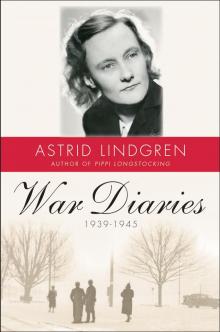 A World Gone Mad: The Wartime Diaries
A World Gone Mad: The Wartime Diaries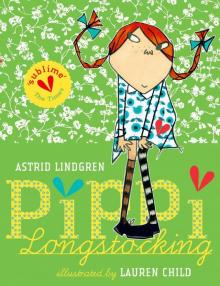 Pippi Longstocking
Pippi Longstocking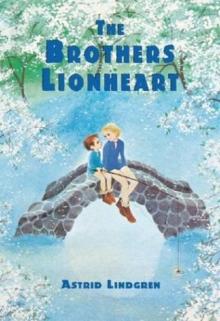 The Brothers Lionheart
The Brothers Lionheart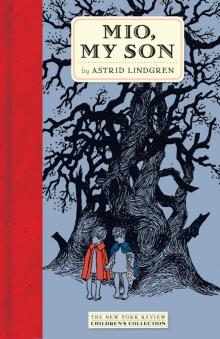 Mio, My Son
Mio, My Son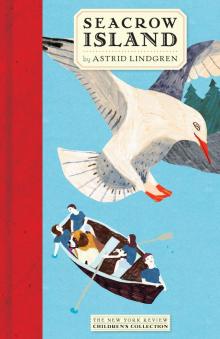 Seacrow Island
Seacrow Island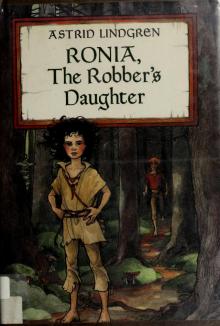 Ronia, The Robber's Daughter
Ronia, The Robber's Daughter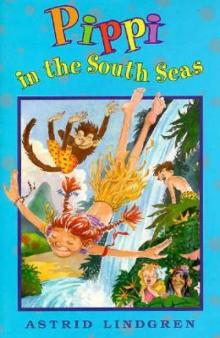 Pippi in the South Seas
Pippi in the South Seas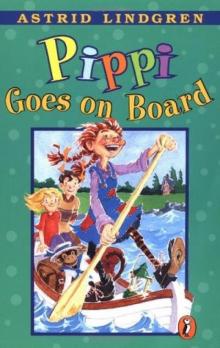 Pippi Goes on Board
Pippi Goes on Board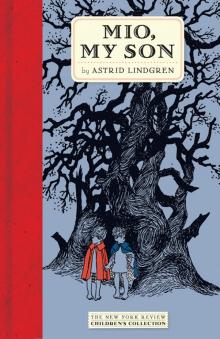 Astrid Lindgren, illustrated by Ilon Wikland, translated from the Swedish by Jill Morgan
Astrid Lindgren, illustrated by Ilon Wikland, translated from the Swedish by Jill Morgan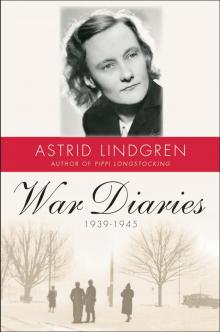 War Diaries, 1939-1945
War Diaries, 1939-1945